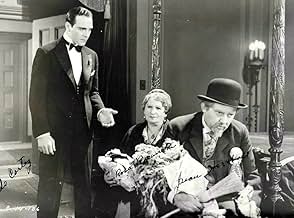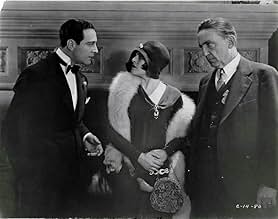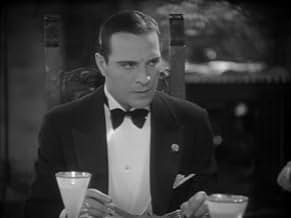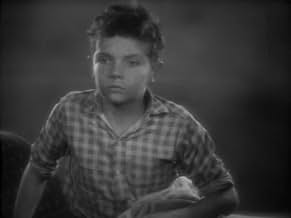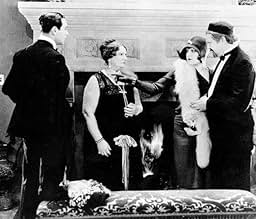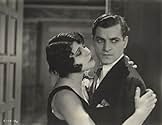Ajouter une intrigue dans votre langueSoap-opera about a social-climbing Jewish man and his old-world parents who are heartbroken by his rejection of them.Soap-opera about a social-climbing Jewish man and his old-world parents who are heartbroken by his rejection of them.Soap-opera about a social-climbing Jewish man and his old-world parents who are heartbroken by his rejection of them.
- Réalisation
- Scénario
- Casting principal
Syd Crossley
- Goldfish's Butler
- (as Sid Crossley)
Joe Bordeaux
- Crook
- (non crédité)
Ferike Boros
- Delancey Street Woman
- (non crédité)
Clarence Burton
- Police Desk Sergeant
- (non crédité)
Paul Ellis
- Crook
- (non crédité)
Ruth Feldman
- Market Woman
- (non crédité)
Otto Fries
- Tradesman
- (non crédité)
Julia Swayne Gordon
- Mrs. Striker
- (non crédité)
Donald Hall
- Minor Role
- (non crédité)
Leon Janney
- Eddie Lesser as a Boy
- (non crédité)
Julanne Johnston
- Irma Striker
- (non crédité)
Virginia Marshall
- Birdie Goldfish as a Girl
- (non crédité)
Avis à la une
Morris Goldfish grew up on New York's poor Lower East Side with his Jewish family. His father is a fun loving guy with all his friends but they don't have much money. The kids accidentally burn down their home but Morris fights to save their valuables. He uses the same tenacity to be a successful business and moves the family to rich Fifth Avenue. His father is tired of the stuffy social climbing from Morris and not happy being no longer the head of the household while mother and sister Birdie are overjoyed with their rise in status. Morris changes him name from Goldfish to Fish.
This is my earliest Frank Capra film. It is silent except for some synchronized music and some talking sequences. It's always fascinating to see incremental advancements in technology. This mix of silent and sound is a real platypus. It actually affects the tone and the style of the movie. Of course, all of that is beyond the filmmaker's intention. It's just the sense from a modern viewer.
The father son relationship is pure Capra. It's a familiar Capra theme of money don't buy you happiness. I love the path that the movie is going on until Birdie and her boyfriend become the nexus of the plot in the middle. It's too much. Quite frankly, Morris can simply kick Birdie out for marrying poor. The whole crime is contrived. The movie does go back to the father son relationship which is a good thing. The big climatic moment in the lobby is both effective and flawed. There needs to be something more obvious for Morris to deny his parents. In the movie, he's already suppose to introduce his parents to the upper crust guests during the dinner. It needs an extra push. It needs his guest to say something derogatory about them being poor. It's a great moment but it needs a better reason for Morris. Overall, the movie gets a bit too melodramatic. This is a great film for Capra fans and they would be very familiar with the theme.
This is my earliest Frank Capra film. It is silent except for some synchronized music and some talking sequences. It's always fascinating to see incremental advancements in technology. This mix of silent and sound is a real platypus. It actually affects the tone and the style of the movie. Of course, all of that is beyond the filmmaker's intention. It's just the sense from a modern viewer.
The father son relationship is pure Capra. It's a familiar Capra theme of money don't buy you happiness. I love the path that the movie is going on until Birdie and her boyfriend become the nexus of the plot in the middle. It's too much. Quite frankly, Morris can simply kick Birdie out for marrying poor. The whole crime is contrived. The movie does go back to the father son relationship which is a good thing. The big climatic moment in the lobby is both effective and flawed. There needs to be something more obvious for Morris to deny his parents. In the movie, he's already suppose to introduce his parents to the upper crust guests during the dinner. It needs an extra push. It needs his guest to say something derogatory about them being poor. It's a great moment but it needs a better reason for Morris. Overall, the movie gets a bit too melodramatic. This is a great film for Capra fans and they would be very familiar with the theme.
This film is one of the rare surviving goat gland films, that is, it's a part talkie. The film was made in 1929, and although more financially or technically advanced studios had graduated to all-talking pictures by now, poverty row Columbia was just beginning to work with the new technology. As a result, the film is split rather oddly into silent and talking portions, and it goes back and forth between talking and silent throughout the picture. However, it is very well done in spite of this. They must have had some trouble with synchronization, because often the speaking portions will have the speaker turn his/her back to the camera so you can't see that the sound is out of sync. Also, there is a song performed at a distance in which you can clearly see that the singer's lips and the song are out of sync.
Enough about the poverty row qualifications. The film itself is an excellent Frank Capra work about a Jewish family in a poorer section of New York City. Don't expect the optimistic Capra of later years here, though. The film is surprisingly downbeat although the Capra themes of the importance of family and the evils of chasing riches for riches sake shine through.
The film opens with Julius Goldfish (Jean Hersholt) selling from his push-cart. Actually, he's loafing and talking with friends and ignoring the push-cart. His wife Tilda (Rosa Rosanova) scolds him about his loafing and says he'll never get ahead. Meanwhile their children do not get along with each other. Morris, their son, is always looking for ways to make money, even salvaging stuff from a burning building in order to have a fire sale. Birdie Goldfish (as an adult, Lina Basquette) and Eddie Lesser (as an adult, Rex Lease) are childhood sweethearts. Ma Goldfish is always building up Morris' industry and ingenuity, and Birdie is Pa Goldfish's pride and joy, although Ma and Pa love both children.
Time passes, and the adult Morris (Ricardo Cortez) builds up the push-cart into a thriving antique business and moves the entire family to Fifth Avenue, not so much because he wants his family with him, but because you feel he would be embarrassed to have it known that his family is living on the East Side. Morris even changes his name to Fish to leave his Jewish roots behind and be accepted in the gentile social circles of upper crust New York City. To this end he tries to control the lives of his parents and his grown sister, even shooting disapproving looks at his dad whenever he wears his prayer shawl. Eventually Morris turns his parents into museum pieces and pushes his sister out of the family when her marriage to Eddie embarrasses him socially. The end is bitter-sweet with a final scene that is hard to forget.
Highly recommended as a touching dawn of sound film and a showcase of Capra's talents during this technologically challenging era when so many others were making either stiffly acted static dramas or ludicrous musicals in this transitional year of all-talking pictures.
Enough about the poverty row qualifications. The film itself is an excellent Frank Capra work about a Jewish family in a poorer section of New York City. Don't expect the optimistic Capra of later years here, though. The film is surprisingly downbeat although the Capra themes of the importance of family and the evils of chasing riches for riches sake shine through.
The film opens with Julius Goldfish (Jean Hersholt) selling from his push-cart. Actually, he's loafing and talking with friends and ignoring the push-cart. His wife Tilda (Rosa Rosanova) scolds him about his loafing and says he'll never get ahead. Meanwhile their children do not get along with each other. Morris, their son, is always looking for ways to make money, even salvaging stuff from a burning building in order to have a fire sale. Birdie Goldfish (as an adult, Lina Basquette) and Eddie Lesser (as an adult, Rex Lease) are childhood sweethearts. Ma Goldfish is always building up Morris' industry and ingenuity, and Birdie is Pa Goldfish's pride and joy, although Ma and Pa love both children.
Time passes, and the adult Morris (Ricardo Cortez) builds up the push-cart into a thriving antique business and moves the entire family to Fifth Avenue, not so much because he wants his family with him, but because you feel he would be embarrassed to have it known that his family is living on the East Side. Morris even changes his name to Fish to leave his Jewish roots behind and be accepted in the gentile social circles of upper crust New York City. To this end he tries to control the lives of his parents and his grown sister, even shooting disapproving looks at his dad whenever he wears his prayer shawl. Eventually Morris turns his parents into museum pieces and pushes his sister out of the family when her marriage to Eddie embarrasses him socially. The end is bitter-sweet with a final scene that is hard to forget.
Highly recommended as a touching dawn of sound film and a showcase of Capra's talents during this technologically challenging era when so many others were making either stiffly acted static dramas or ludicrous musicals in this transitional year of all-talking pictures.
I just had the opportunity to see this film on our most valuable classic film resource, TCM. It was good to see, purely for historic purposes regarding Frank Capra's career. One good thing about the silent parts is that if you had taped or Tivo'd the film, you can scan the silent scenes at double speed and still follow the story. One curious thing (stemming from the original story) stood out for me though; if I wanted to change my name from Goldfish to a classier name, I would surely change it to Gold instead of Fish! After all, Samuel Goldfish changed his name to Goldwyn. I say, when in doubt, keep the Gold and lose the Fish!
Younger Generation, The (1929)
** 1/2 (out of 4)
Early Capra melodrama has poor Jewish family taken out of the ghetto by their youngest son (Ricardo Cortez) who strikes it big. He moves his father (Jean Hersholt), mother (Rosa Rosanova) and sister (Lina Basquette) into a large house and expects them to do what he says and stay away from the "filth" they grew up around. Soon the three start to realize that money can't buy happiness but will the son learn this before it's too late? At this point in time Columbia was still a very small studio so they couldn't afford to go all in in terms of sound movies so this is another example of a silent with a few sound segments scattered throughout the film. I've always found this to be incredibly distracting but I think Capra does a great job at when to use the sound and I also think the quality of the recorded words is among the best I've heard from this era. Considering how poor the studio was it's rather shocking that some of the other studios early talkies didn't come off sounding better. With that said, there are some major problems with the film but for the most part it's a nice time filler that fans of the director will want to check out. The biggest problem is that even in 1929 this material was way too predictable. There's really not a single thing that happens in the film that you won't see coming from a mile away. The format pretty much follows every morality film that came before it and I just wish at some point Capra would have shaken things up just to keep us off guard or at least in some drama. It should come as no shock that Capra does a great job with what's here and manages to keep the film moving quite fast and he keeps it as entertaining as the screenplay will allow. The cast also keeps things moving nicely with their fine performances. Cortez would play this type of role countless times in his career and he always managed to do good with it. Hersholt clearly steals the film as the tortured father. In the end, this isn't the greatest film ever made but I think Capra did the most he could considering what he had to work with. I think those who like to search out these early talkies will find the quality here to be above average and will make one wonder why some of the bigger studios didn't have their stuff sounding as good.
** 1/2 (out of 4)
Early Capra melodrama has poor Jewish family taken out of the ghetto by their youngest son (Ricardo Cortez) who strikes it big. He moves his father (Jean Hersholt), mother (Rosa Rosanova) and sister (Lina Basquette) into a large house and expects them to do what he says and stay away from the "filth" they grew up around. Soon the three start to realize that money can't buy happiness but will the son learn this before it's too late? At this point in time Columbia was still a very small studio so they couldn't afford to go all in in terms of sound movies so this is another example of a silent with a few sound segments scattered throughout the film. I've always found this to be incredibly distracting but I think Capra does a great job at when to use the sound and I also think the quality of the recorded words is among the best I've heard from this era. Considering how poor the studio was it's rather shocking that some of the other studios early talkies didn't come off sounding better. With that said, there are some major problems with the film but for the most part it's a nice time filler that fans of the director will want to check out. The biggest problem is that even in 1929 this material was way too predictable. There's really not a single thing that happens in the film that you won't see coming from a mile away. The format pretty much follows every morality film that came before it and I just wish at some point Capra would have shaken things up just to keep us off guard or at least in some drama. It should come as no shock that Capra does a great job with what's here and manages to keep the film moving quite fast and he keeps it as entertaining as the screenplay will allow. The cast also keeps things moving nicely with their fine performances. Cortez would play this type of role countless times in his career and he always managed to do good with it. Hersholt clearly steals the film as the tortured father. In the end, this isn't the greatest film ever made but I think Capra did the most he could considering what he had to work with. I think those who like to search out these early talkies will find the quality here to be above average and will make one wonder why some of the bigger studios didn't have their stuff sounding as good.
Based on a play by Fannie Hurst, The Younger Generation might be Frank Capra's most personal film up to this point. We've had films that felt like he was just for hire (Submarine and both the Harry Langdon films) and films where he was saying what he wanted to say (pretty much everything else to one degree or another), but this almost feels somewhat autobiographical. Sure, Capra was Italian and not Jewish, but it's about the immigrant experience and the difference between people who came to America as adults and those who were raised on its streets. Well, Capra was raised on those streets and had parents who moved to America as adults (he emigrated from Italy with his family when he was five years old), so this just feels like it should be personal.
The Goldfish family is living on the East Side of New York City while the mother Tilda (Rosa Rosanova) tries to make a living, the father Julius (Jean Hersholt) makes jokes with his friends on the street corner, little Birdie (Lina Basquette as an adult) makes friends with the boy across the way Eddie (Rex Lease as an adult), and the boy Maurice (Ricardo Cortez as an adult) with a real drive for business. When Maruice gets into a fight with Eddie, Maruice accidentally hits the oil lamp above the stove, sending the apartment up in a blaze, but he's not put out by it. He'll make money from their leftover possessions, setting the stage for him to build an import art empire roughly fifteen years later.
The core of the film's story is the implied conflict between the younger and older generations, but it's not quite the simplistic battle of the ages that that implies. Instead, it's a conflict of visions that mostly manifests as the dramatic butting of heads between Maurice and Birdie since the brother is obsessed with status and position in his new life while Birdie has kept up her relationship with Eddie to the point that she wants to marry him.
It's interesting to see the big guy versus little guy dynamic manifest here within a family unit with Maurice becoming the big guy, losing sight of his own humanity, and pushing away everyone else while controlling them with his money, much to the chagrin of everyone else in the family, in particular Julius and Birdie who act like partners in crime. Things turn when Eddie, in a fit of desperation to be good enough for Birdie in Maurice's eyes (I think, this is thin and needs more, to be honest), he helps some local hoods knock off a jewelry story by riding up on the street and singing a song to offer up a distraction. It's a scandal that gets quickly found out, leading to Birdie rededicating her love to him by marrying him and Maurice kicking her out while preventing his parents from knowing that he'd done it.
Now, I should comment on the fact that this is Capra's first sound film. Well, partial sound film. I don't know the background for sure, but it seems like it was at least mostly filmed, The Jazz Singer came out, and they went back to film four scenes with the new sound technology. The transition from silent to sound is the most interesting period in film, in my opinion, and one measure of a director's ability to adapt to changing circumstances. John Ford failed it with The Black Watch while Ernst Lubitsch passed with flying colors in The Love Parade. Capra falls more towards the Lubitsch side, though being only a part talkie there are limits to what one can say on that front. I just want to note that the four scenes are dialogue heavy scenes (similar to Hitchcock's first effort at sound, Blackmail), but he films it like any competent dialogue scene from the later pre-Code period would be filmed, complete with dialogue cutting into shots with people who aren't talking, helping to blend shots confidently. It's surprisingly well done stuff, and it happens to be in a pretty good story to boot. In terms of part-talkies, it recalled the confident way that William Wyler approached it in The Love Trap.
Anyway, the film speeds towards its conclusion after the passage of two years with Eddie in jail, Birdie having his child, and Julius reaches a low point in his health without any contact from his beloved daughter because Maurice is tearing up her letters all leading to the kind of warm-hearted resolution that Capra was known for, though this is tinged with some pointed sadness. It's not entirely happy, Maurice's antagonism towards Birdie gets somewhat resolved but he can't be happy, not even with his money. And that points to what has quickly formed to be Capra's running theme: the little guys prioritize things that the big guys don't, but there are things to be learned across that gap.
It's not a great film, perhaps more interesting for Capra's first foray into sound more than anything else, but it's a solidly entertaining little melodrama that never elevates the material but executes it with some skill.
The Goldfish family is living on the East Side of New York City while the mother Tilda (Rosa Rosanova) tries to make a living, the father Julius (Jean Hersholt) makes jokes with his friends on the street corner, little Birdie (Lina Basquette as an adult) makes friends with the boy across the way Eddie (Rex Lease as an adult), and the boy Maurice (Ricardo Cortez as an adult) with a real drive for business. When Maruice gets into a fight with Eddie, Maruice accidentally hits the oil lamp above the stove, sending the apartment up in a blaze, but he's not put out by it. He'll make money from their leftover possessions, setting the stage for him to build an import art empire roughly fifteen years later.
The core of the film's story is the implied conflict between the younger and older generations, but it's not quite the simplistic battle of the ages that that implies. Instead, it's a conflict of visions that mostly manifests as the dramatic butting of heads between Maurice and Birdie since the brother is obsessed with status and position in his new life while Birdie has kept up her relationship with Eddie to the point that she wants to marry him.
It's interesting to see the big guy versus little guy dynamic manifest here within a family unit with Maurice becoming the big guy, losing sight of his own humanity, and pushing away everyone else while controlling them with his money, much to the chagrin of everyone else in the family, in particular Julius and Birdie who act like partners in crime. Things turn when Eddie, in a fit of desperation to be good enough for Birdie in Maurice's eyes (I think, this is thin and needs more, to be honest), he helps some local hoods knock off a jewelry story by riding up on the street and singing a song to offer up a distraction. It's a scandal that gets quickly found out, leading to Birdie rededicating her love to him by marrying him and Maurice kicking her out while preventing his parents from knowing that he'd done it.
Now, I should comment on the fact that this is Capra's first sound film. Well, partial sound film. I don't know the background for sure, but it seems like it was at least mostly filmed, The Jazz Singer came out, and they went back to film four scenes with the new sound technology. The transition from silent to sound is the most interesting period in film, in my opinion, and one measure of a director's ability to adapt to changing circumstances. John Ford failed it with The Black Watch while Ernst Lubitsch passed with flying colors in The Love Parade. Capra falls more towards the Lubitsch side, though being only a part talkie there are limits to what one can say on that front. I just want to note that the four scenes are dialogue heavy scenes (similar to Hitchcock's first effort at sound, Blackmail), but he films it like any competent dialogue scene from the later pre-Code period would be filmed, complete with dialogue cutting into shots with people who aren't talking, helping to blend shots confidently. It's surprisingly well done stuff, and it happens to be in a pretty good story to boot. In terms of part-talkies, it recalled the confident way that William Wyler approached it in The Love Trap.
Anyway, the film speeds towards its conclusion after the passage of two years with Eddie in jail, Birdie having his child, and Julius reaches a low point in his health without any contact from his beloved daughter because Maurice is tearing up her letters all leading to the kind of warm-hearted resolution that Capra was known for, though this is tinged with some pointed sadness. It's not entirely happy, Maurice's antagonism towards Birdie gets somewhat resolved but he can't be happy, not even with his money. And that points to what has quickly formed to be Capra's running theme: the little guys prioritize things that the big guys don't, but there are things to be learned across that gap.
It's not a great film, perhaps more interesting for Capra's first foray into sound more than anything else, but it's a solidly entertaining little melodrama that never elevates the material but executes it with some skill.
Le saviez-vous
- AnecdotesFirst part-dialog sound film for Columbia Pictures and director Frank Capra. Both wanted to make an all-talking film, but equipped sound stages were at a premium at the time.
- GaffesWhen Birdie tells Eddie (via intertitle) that his song has been sold for $1000, he excitedly mouths the words "Five thousand?"
- Citations
Title Card: New York's Lower East Side--a melting pot, where the younger generation struggles to free itself from the old-world ideas of its fathers.
- ConnexionsFeatured in Frank Capra's American Dream (1997)
Meilleurs choix
Connectez-vous pour évaluer et suivre la liste de favoris afin de recevoir des recommandations personnalisées
Détails
- Durée1 heure 15 minutes
Contribuer à cette page
Suggérer une modification ou ajouter du contenu manquant

Lacune principale
By what name was Loin du ghetto (1929) officially released in India in English?
Répondre
